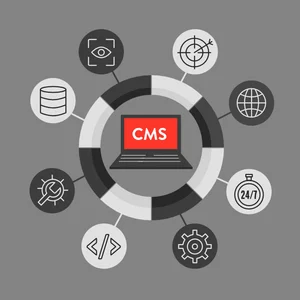In today’s digital age, creating, managing, and delivering content on the internet has become a cornerstone of communication and business success. Content Management Systems (CMS) play a pivotal role in simplifying this process. This blog aims to demystify CMS by exploring what it is, its significance, popular options, and why it matters for businesses and individuals alike.
What is a Content Management System (CMS)?
A Content Management System, often abbreviated as CMS, is a software application that enables users to create, manage, and organize digital content, primarily for websites, without requiring in-depth technical expertise. CMS platforms provide an intuitive interface that allows users to design, publish, and update content with ease.
The Significance of CMS
CMS platforms have revolutionized the way content is handled on the internet, offering numerous advantages:
- Ease of Use: CMS platforms are designed to be user-friendly, enabling individuals with minimal technical skills to manage and update web content effortlessly.
- Efficient Collaboration: Multiple users can collaborate on content creation and management simultaneously, which is particularly useful for large organizations.
- Consistency: CMS ensures a consistent look and feel across a website, helping to maintain a cohesive brand identity.
- Time and Cost Efficiency: By simplifying content management, CMS reduces the time and resources required to maintain a website, ultimately saving money.
- Scalability: CMS platforms can scale to accommodate growing content needs, making them suitable for both small blogs and large e-commerce websites.
Popular Content Management Systems
Several CMS platforms are widely used across the internet, each catering to different needs and preferences:
- WordPress: WordPress is the most popular CMS globally, known for its flexibility and extensive library of plugins and themes. It’s ideal for bloggers, small businesses, and even large enterprises.
- Joomla: Joomla is a robust CMS favored for its versatility and ability to handle complex content structures. It’s often used for community websites and e-commerce platforms.
- Drupal: Drupal is known for its security and scalability. It’s a top choice for organizations with complex content management requirements.
- Wix: Wix is a user-friendly website builder that offers both CMS and hosting services. It’s popular among small businesses and individuals seeking an all-in-one solution.
- Squarespace: Squarespace is a visually appealing CMS known for its stunning templates and ease of use. It’s favored by creatives and artists.
- Magento: Magento is a powerful e-commerce-focused CMS, perfect for businesses looking to create sophisticated online stores.
Why CMS Matters
Understanding the importance of CMS is crucial, especially in a digital-first world:
- Content Control: CMS empowers users to have full control over their content, allowing for real-time updates and improvements.
- SEO Friendliness: Most CMS platforms are SEO-friendly, making it easier to optimize content for search engines and improve online visibility.
- User Engagement: An efficiently managed CMS ensures a better user experience, which can lead to higher engagement and conversions.
- Business Growth: Scalability and flexibility offered by CMS platforms enable businesses to adapt and grow in the digital landscape.
- Competitive Advantage: Staying current with CMS trends and utilizing the right platform can give businesses a competitive edge in their respective industries.
 Conclusion
Conclusion
In the digital age, the role of Content Management Systems cannot be overstated. They empower individuals and organizations to create, manage, and deliver content seamlessly, ensuring a positive online presence. Whether you’re a blogger, a small business owner, or a large corporation, choosing the right CMS is a pivotal decision that can shape your online success. As the digital landscape continues to evolve, embracing the capabilities of CMS platforms will remain essential for staying relevant and effective in the online world.

